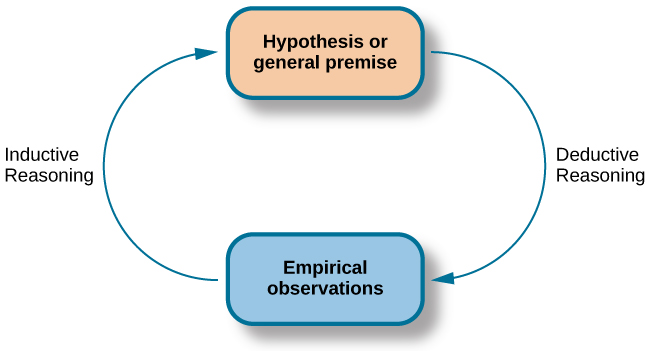| << Chapter < Page | Chapter >> Page > |
In the end, research is what makes the difference between facts and opinions. Facts are observable realities, and opinions are personal judgments, conclusions, or attitudes that may or may not be accurate. In the scientific community, facts can be established only using evidence collected through empirical research.
Scientific knowledge is advanced through a process known as the scientific method . Basically, ideas (in the form of theories and hypotheses) are tested against the real world (in the form of empirical observations), and those empirical observations lead to more ideas that are tested against the real world, and so on. In this sense, the scientific process is circular. The types of reasoning within the circle are called deductive and inductive. In deductive reasoning , ideas are tested against the empirical world; in inductive reasoning , empirical observations lead to new ideas ( [link] ). These processes are inseparable, like inhaling and exhaling, but different research approaches place different emphasis on the deductive and inductive aspects.

In the scientific context, deductive reasoning begins with a generalization—one hypothesis—that is then used to reach logical conclusions about the real world. If the hypothesis is correct, then the logical conclusions reached through deductive reasoning should also be correct. A deductive reasoning argument might go something like this: All living things require energy to survive (this would be your hypothesis). Ducks are living things. Therefore, ducks require energy to survive (logical conclusion). In this example, the hypothesis is correct; therefore, the conclusion is correct as well. Sometimes, however, an incorrect hypothesis may lead to a logical but incorrect conclusion. Consider this argument: all ducks are born with the ability to see. Quackers is a duck. Therefore, Quackers was born with the ability to see. Scientists use deductive reasoning to empirically test their hypotheses. Returning to the example of the ducks, researchers might design a study to test the hypothesis that if all living things require energy to survive, then ducks will be found to require energy to survive.
Deductive reasoning starts with a generalization that is tested against real-world observations; however, inductive reasoning moves in the opposite direction. Inductive reasoning uses empirical observations to construct broad generalizations. Unlike deductive reasoning, conclusions drawn from inductive reasoning may or may not be correct, regardless of the observations on which they are based. For instance, you may notice that your favorite fruits—apples, bananas, and oranges—all grow on trees; therefore, you assume that all fruit must grow on trees. This would be an example of inductive reasoning, and, clearly, the existence of strawberries, blueberries, and kiwi demonstrate that this generalization is not correct despite it being based on a number of direct observations. Scientists use inductive reasoning to formulate theories, which in turn generate hypotheses that are tested with deductive reasoning. In the end, science involves both deductive and inductive processes.

Notification Switch
Would you like to follow the 'Psychology' conversation and receive update notifications?